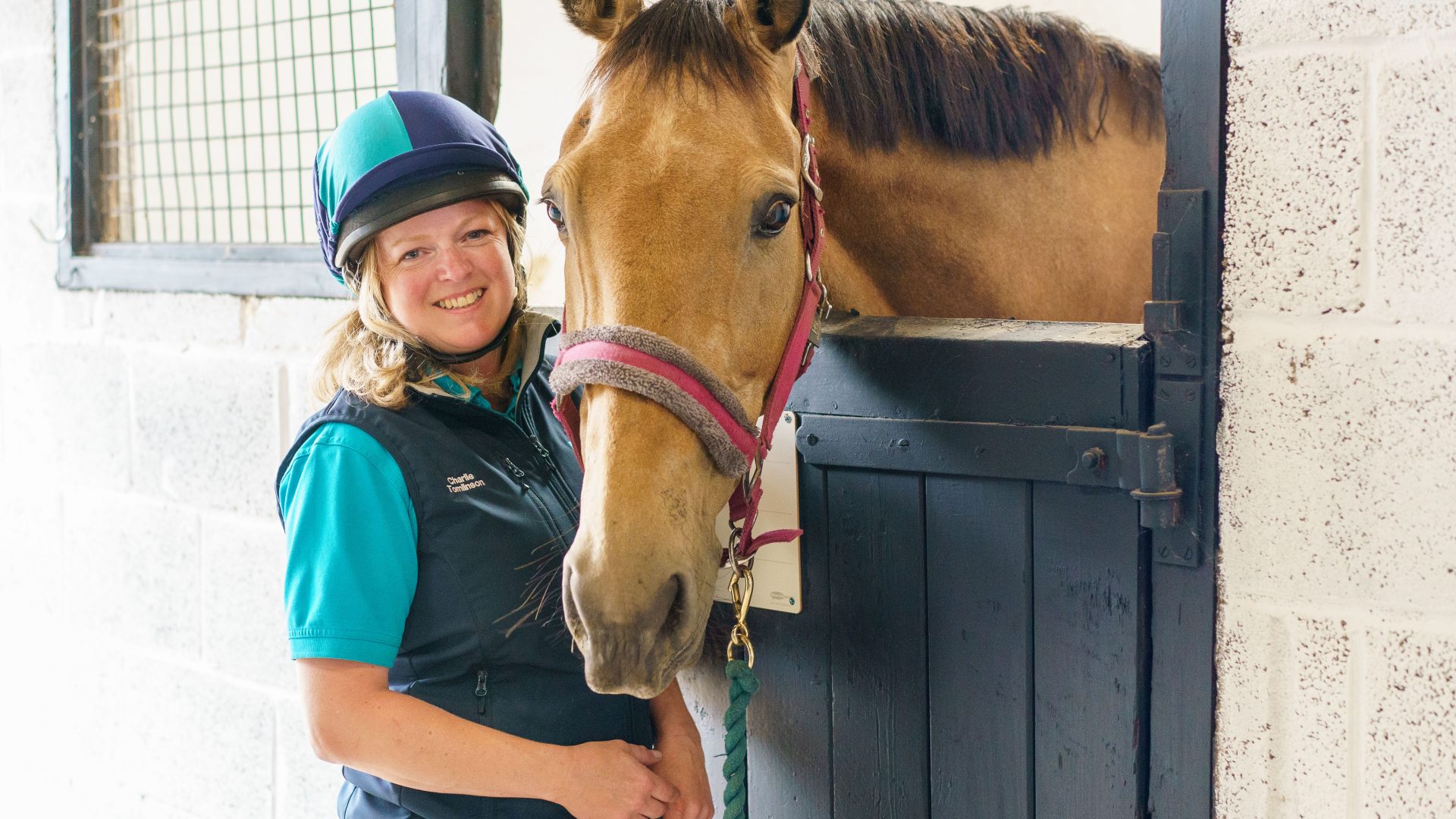A VET, who suffered serious head injuries while examining a horse, is backing our campaign to encourage colleagues to wear safety helmets when handling equines.
Charlie Tomlinson, a clinical director at Hale Vets in Wiltshire, admits she is lucky to be alive after a freak accident while nerve-blocking a horse’s front leg, which left her with devastating injuries and meant she couldn’t work for six months.
The horse, a well-behaved gelding, who was good to handle, reacted completely out of character and flung his front legs forward, scooping Charlie up and throwing her head first into a stable wall.
Charlie, who was not wearing a hat, suffered diffuse axonal injury, a traumatic brain injury, and was taken unconscious to Royal United Hospital in Bath.
The incident happened in 2009 but she is still feeling the after-effects as she lost hearing in her left ear, suffers from dizzy spells and memory loss.
 Now Charlie is supporting a campaign by VetPartners to encourage equine vets, nurses and all horse handlers to wear safety helmets. The veterinary group has provided all of its UK equine practices with hard hats for team members to wear when conducting certain procedures with equine patients.
Now Charlie is supporting a campaign by VetPartners to encourage equine vets, nurses and all horse handlers to wear safety helmets. The veterinary group has provided all of its UK equine practices with hard hats for team members to wear when conducting certain procedures with equine patients.
The safety campaign, called Hat Hair – Don’t Care, has seen VetPartners team up with hat manufacturer Charles Owen to provide practices with hats and branded silks.
Charlie said: “I am really proud of what VetPartners is doing to care for team members who handle horses and, if this stops another vet from suffering serious head injuries, it will be very successful. Since my accident, I have always worn a hat as horses are big and unpredictable and something can happen in a split second.
“VetPartners is using the power it has as a large veterinary group to encourage everyone to wear hats and help clients to understand why their vet will be wearing a helmet. Wearing a hat has been perceived as a sign of weakness with owners, perhaps wondering if their vet is less experienced or nervous of handling horses, but this is about safety as even the best behaved horses cause an injury.
“Head injuries are sadly a high risk for equine vets, nurses and anyone handling a horse at a practice and they occur in all sorts of circumstances. People can be seriously hurt, and in some cases, suffer life-threatening injuries, so VetPartners is putting the safety and wellbeing of teams at the top of its agenda.”
‘I was flung like a ragdoll’
Charlie can remember nothing of the incident that caused her life-threatening injuries. The air ambulance was called but it was unable to find anywhere to land so she had to be taken to hospital by road.
 She added: “It was a nice horse with no history of behaving like this, and it was a simple nerve block procedure. The first needle went in OK but the horse reacted completely out of character to the second one. I was flung to the back of the stable like a ragdoll and knocked unconscious.
She added: “It was a nice horse with no history of behaving like this, and it was a simple nerve block procedure. The first needle went in OK but the horse reacted completely out of character to the second one. I was flung to the back of the stable like a ragdoll and knocked unconscious.
“The saving grace was that I didn’t suffer a bleed on the brain and I consider myself incredibly lucky to have survived. As well as suffering a brain injury, I damaged my neck and suffered severe headaches and narcolepsy, where I would fall asleep during the day. I couldn’t speak properly, I lost my sense of smell and, as a result, taste is affected.
“I also suffered memory loss as big sections of my life before the accident have gone and I only realise I no longer remember them when someone brings something up and I have no recollection of it. The personality changes were also long term and life changing.
“I lost hearing in my left ear and I still get dizzy spells – things that really affect your life. I wish I had worn a hat back then, but I was worried people would think I was inexperienced or not capable of doing my job.
“It is so important that veterinary teams wear a hat when handling horses. It is great that VetPartners is raising awareness of this extremely important issue and placing so much importance on the wellbeing of its people.”
Keeping yourself safe
Anyone handling a horse at a VetPartners equine or mixed practice is encouraged to wear head protection when:
- Leading horses
- Holding horses for veterinary examinations or procedures, including lameness workup
- Lunging horses
- Grooming or picking out feet
- Turning out horses in paddocks
- Clipping, shoe removal, administering injections and nasogastric intubation
- Assisting loading
- Riding
Vets are also urged to consider wearing head protection as standard for swabbing stallions or any procedure involving a stallion’s reproductive organs, hind limb nerve blocks and injecting horses of known or declared poor temperament.
For media enquiries, please contact Amanda Little, VetPartners Senior PR and Communications Manager, on 07970 198 492 or email amanda.little@vetpartners.co.uk

